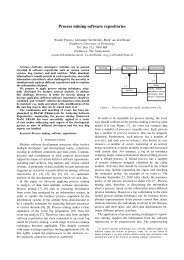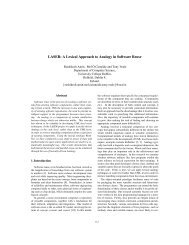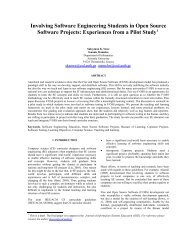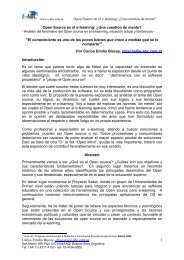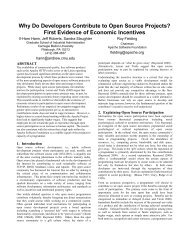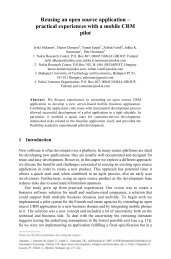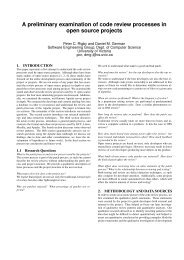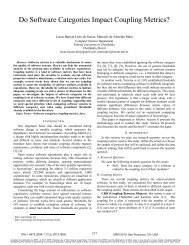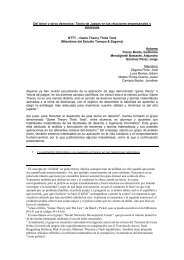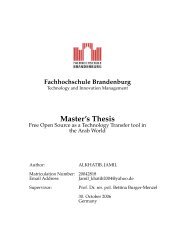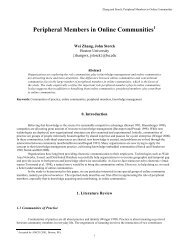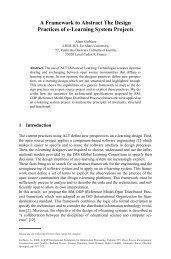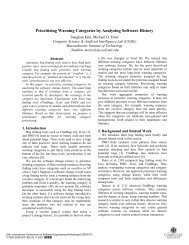Fostering cooperation on the Internet: social exchange processes in ...
Fostering cooperation on the Internet: social exchange processes in ...
Fostering cooperation on the Internet: social exchange processes in ...
Create successful ePaper yourself
Turn your PDF publications into a flip-book with our unique Google optimized e-Paper software.
However, models of <strong>exchange</strong> differ c<strong>on</strong>siderably <strong>in</strong> <strong>the</strong>ir view about what is <strong>exchange</strong>d betweentwo parties and how <strong>exchange</strong> is <strong>in</strong>fluence by various endogenous and exogenous factors. The‘ec<strong>on</strong>omic model’ assumes that th<strong>in</strong>gs are <strong>exchange</strong>d for <strong>the</strong>ir ec<strong>on</strong>omic or utilitarian value,whereas accord<strong>in</strong>g to <strong>the</strong> ‘<strong>social</strong> model’ <strong>exchange</strong> takes place <strong>on</strong> <strong>the</strong> basis of <strong>the</strong> symbolic valueattached to th<strong>in</strong>gs (Ekeh, 1974).Both views assume that <strong>in</strong>dividuals engage <strong>in</strong> <strong>exchange</strong> to achieve certa<strong>in</strong> important goalsthat are extr<strong>in</strong>sic to <strong>the</strong> behavior <strong>the</strong>y engage <strong>in</strong>. Extr<strong>in</strong>sic or <strong>in</strong>strumental rewards are amotivati<strong>on</strong> source when <strong>in</strong>dividuals believe that behavior will lead to certa<strong>in</strong> valued outcomes,utilitarian and/or symbolic. Social <strong>in</strong>teracti<strong>on</strong> is viewed as an <strong>exchange</strong> of mutually reward<strong>in</strong>gactivities <strong>in</strong> which <strong>the</strong> receipt of a needed valuable is c<strong>on</strong>t<strong>in</strong>gent <strong>on</strong> <strong>the</strong> supply of a favor <strong>in</strong>return. Expectati<strong>on</strong>s of reciprocity are based <strong>on</strong> <strong>the</strong> rati<strong>on</strong>al grounds that <strong>in</strong>dividuals evaluate <strong>the</strong><strong>in</strong>put/output ratio of a certa<strong>in</strong> behavior <strong>in</strong> relati<strong>on</strong> to a referent o<strong>the</strong>r. Equity <strong>the</strong>ory (Walster etal., 1978) assumes that people tend to balance this ratio simply by return<strong>in</strong>g appropriateutilitarian and <strong>social</strong> rewards for <strong>the</strong> benefits ga<strong>in</strong>ed. Whereas most ec<strong>on</strong>omic transacti<strong>on</strong>s aresimultaneous <strong>exchange</strong>s <strong>in</strong>dividuals, with<strong>in</strong> <strong>the</strong> <strong>social</strong> model, rely <strong>on</strong> and trust each o<strong>the</strong>r forfuture favors. This creates a ‘general <strong>social</strong> <strong>in</strong>debtedness’ that forms <strong>the</strong> basis of a community(Haas and Deseran, 1981). Accord<strong>in</strong>g to this view susta<strong>in</strong>able <strong>social</strong> <strong>exchange</strong> depends <strong>on</strong>whe<strong>the</strong>r this system of <strong>exchange</strong> can be kept <strong>in</strong> balance <strong>in</strong> general, over time, and across peoplera<strong>the</strong>r than <strong>on</strong> an immediate, <strong>on</strong>e-to-<strong>on</strong>e basis.Organizati<strong>on</strong>al <strong>the</strong>orists agree that people not <strong>on</strong>ly apply equity rules but use a variety ofpr<strong>in</strong>ciples and values as <strong>the</strong> basis for <strong>exchange</strong> (Kabanoff, 1991). Equity, equality or o<strong>the</strong>r rules,such as <strong>the</strong> need pr<strong>in</strong>ciple are called <strong>on</strong>, depend<strong>in</strong>g <strong>on</strong> <strong>the</strong> nature of <strong>the</strong> <strong>social</strong> c<strong>on</strong>text or <strong>the</strong><strong>social</strong> <strong>in</strong>terdependence that is <strong>in</strong>volved. Deutsch (1985) found that <strong>in</strong> task-directed relati<strong>on</strong>shipspeople tend to adopt distributive pr<strong>in</strong>ciples of equity accord<strong>in</strong>g to <strong>the</strong> potential to c<strong>on</strong>tribute and8



